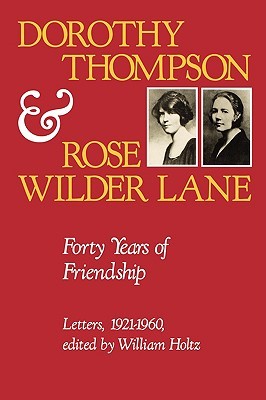From the December 1991 issue of Chronicles.
In 1920, when Rose Wilder Lane met Dorothy Thompson, Lane was 33 and working in Paris, writing publicity stories for the American Red Cross. She had started out in California at the San Francisco Bulletin; written biographies of Herbert Hoover, Henry Ford, and Jack London; and she would go on to be one of the highest-paid magazine writers of her day and a best-selling novelist, as well as her mother’s impetus to write the Laura Ingalls Wilder Little House series.
Dorothy Thompson, the 27-year-old daughter of a Methodist minister from western New York, had sailed for Europe earlier in that year with a companion, five hundred dollars, and little else. She, too, was writing publicity stories for the ARC, and since she had come abroad to be a foreign correspondent she was chafing under those constraints. Her first mention of Lane in her diary is characteristically sharp; she observes that at the ARC “Rose Wilder Lane [is] their chiefest writer with her sob stuff.” Yet these two women had just begun a friendship that was to last, with greater and lesser intimacy, for the rest of their lives. Rose Lane—the pioneer novelist and individualist, opponent of FDR, and early supporter of Ayn Rand—the woman who in 1965 at the age of 78 went to Vietnam to cover the war for Woman’s Day, is now largely forgotten. Dorothy Thompson, on the other hand, as the first woman to head a foreign news bureau, as the journalist Hitler had thrown out of Germany in 1934, as the New York Herald Tribune‘s enormously popular thrice weekly columnist, and as the second wife of Sinclair Lewis, is much better remembered.
Though when they met Lane was in a position to act as her mentor, Dorothy Thompson was a hard worker and a resourceful reporter who lost little time in establishing herself. Thompson had been in Europe only a little over a year when the Emperor Kari made his final bid for the Hungarian throne, and in October 1921 she, along with the rest of the European press corps, arrived in Budapest to cover the attempted coup. Finding that Karl and the Empress Zita were secluded at Tata, Thompson persuaded her employer and friend. Captain James Pedlow, Commissioner of the ARC in Hungary, to take her in, and she dressed as a nurse while he visited the couple and offered medical help to the eight-months-pregnant empress. As Pedlow talked to Kari, Thompson stood behind a velvet curtain, taking notes. With that interview she had an international scoop.
Both women being reporters and well traveled, their letters to each other cover international as well as personal matters. Between 1926 and 1928 Lane lived in Albania, a country she came to love, and commented often on Balkan politics. Thompson’s special attention was for Austria and Germany, and there is much here as well on her relationship with Lewis, though (in her letters at least) she spared her friends the more painful details of life with an alcoholic. Her husband was not alone in his selfishness, however. When in 1930 Lewis was awarded the Nobel Prize for Literature, Thompson had just had their first and only child, Michael. At the time of the announcement Rose Lane was in New York on a business trip; she was living in the Missouri Ozarks in order to take care of her parents and was working hard to arrange an independent income for them. Nevertheless, she agreed to delay her trip home in order to stay with five-month-old Michael and oversee the Lewises’ large Westport household, thus freeing Thompson to travel to Stockholm and on to Germany and Austria, a trip that took three months. Such generosity was typical of Lane, while the acceptance of it was likewise typical of Thompson.
Dorothy Thompson had a great deal of charm, and whatever her failings as a mother, wife, or even journalist, she exhibited a serious interest in human nature as well as a humorous ambivalence toward her chosen life. Reminiscing about her early years as a suffragette, Thompson favorably quotes Lucy Price, the Phyllis Schlafly of her day, in an early letter to Lane (August 13, 1921): “Lucy said many things which in my maturer days I can applaud. One being that politics was not only no sphere for women but no sphere for anybody.” For her part, Rose Lane is more relaxed and less didactic in her letters than in much of her published work. “I wish to God Rousseau had never been born!” she wrote in 1932. “The world has gone wrong ever since. There’s been no room for the human being in it, since Humanity began taking up so much space.”
Thompson shared some of her belief in the actual human animal, coupled with suspicion of man in his theoretical dimension. Both women were self-sufficient personalities and strongly opposed to the system of federally organized charity that would run roughshod over self-sufficiency. When Rose Lane was visited by a throng of journalists in an anti-New Deal flap, she took the lot of them down to the basement of her Connecticut farmhouse and showed them the hundreds of jars of chicken and vegetables she had put up. “Gentlemen,” she remarked, “this is Social Security.”
In a 1938 column Thompson made a similar point: “I wish to stand on what I consider to be my constitutional right to be insecure. It seems to me that all this solicitude for human rights ought to include the voluntary right to live dangerously, just for those who happen to like it that way.” But Thompson was no isolationist, and her switch of support from Willkie to Roosevelt in the 1940 campaign (Roosevelt, like her, had been in favor of war long before the rest of the country) must certainly have been a disappointment to Lane.
Theirs was a friendship that had already been strained by the differences between their respective social circles, by Lane’s increasingly private life and Thompson’s commitment to overwork and to the company of her famous friends. Their differences in this respect today appear paradigmatic: Thompson chose to immerse herself in the great changes this country and the world went through starting in the 30’s and 40’s, while Lane chose to withdraw from them. Dorothy Thompson has several biographers, while Rose Lane was one of the many people who went against the grain of postwar America and has therefore been swallowed up by the intervening years.

[Dorothy Thompson and Rose Wilder Lane, Forty Years of Friendship: Letters, 1921-1960, edited by William Holtz (Columbia: University of Missouri Press) 208 pp., $24.95]

Leave a Reply